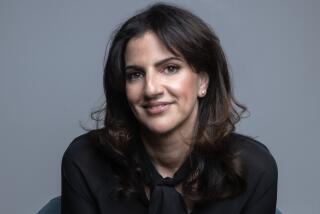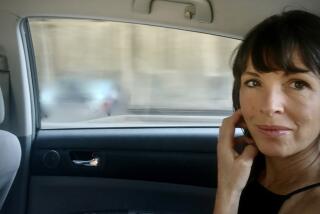âThe Bradshaw Variationsâ by Rachel Cusk
The British novelist Rachel Cusk is not exactly a poster girl for domesticity. In searing, highly interior novels such as âThe Lucky Onesâ (2004), âIn the Foldâ (2005) and âArlington Parkâ (2006), she examines the difficulties of self-definition in the context of family.
Her work varies from scathing drawing room comedies shot through with flickers of August Strindberg to meditations on the emptiness of stay-at-home motherhood and domestic life that channel Virginia Woolfâs âMrs. Dalloway.â
âThe Bradshaw Variations,â Cuskâs seventh novel, strikes a happy -- or should we say, less unhappy -- medium. It offers a series of penetrating snapshots of the demands, sacrifices, trade-offs, trials and benefits of family, in the form of a kaleidoscopic narrative that shifts between various branches of an English clan.
Cuskâs structure accommodates her preference for linked episodes over a unified, plot-driven story line: Like musical variations on a theme, the bookâs 31 short chapters follow the three middle-aged sons of âMaâ and âDadsâ Bradshaw over the course of a year.
Thomas, the middle son -- and the center of the novel -- has recently swapped domestic roles with his wife, Tonie Swann, after her promotion to head of the English department at the university where sheâs been teaching part time for eight years.
Introspective but none too practical, Thomas is happy to quit his job and stay at home, losing himself in piano lessons, literature and the somewhat distracted care of his and Tonieâs 8-year-old daughter, Alexa.
His parents and in-laws, however, are horrified, and openly voice misgivings at the new arrangement. They note the increasing disarray of Tonie and Thomasâ dark, narrow town house.
His father comments, âIâve always tended to the view . . . that work is life for a man, as children are for a woman.â Tonieâs mother, one of the many resentful, nasty matriarchs scattered throughout Cuskâs fiction, is sharper in her disapproval: âA man isnât a man if heâs in the house all day. You need a man, in a marriage.â
While Thomas adapts to his new status with seemingly few misgivings, Tonieâs adjustment is less smooth. On the cusp of 40, â[s]he has entered the phase of atemporality that lies between childbearing and visible decay.â
She is both hungry for attention and eager to spread her wings. But itâs hard to let go entirely at home; she canât help noticing the mounting mess, or the fancy, impractical clothes Thomas buys for Alexa.
Meanwhile, on business trips and at social gatherings, sheâs unsure of herself, flattered by the undivided attentions of men who flirt with her but astounded at their unfamiliarity âwith the idea of home as a set of responsibilities, a scheduled place, like work.â
In contrast with this slovenly household is the happy, chaotic sprawl of Thomasâ older brother, Howard, his wife Claudia, their three children and their demanding dog, who live in a suburb just a mile away. Howard is a businessman who achieved success early with novelty imports.
Claudia complains repeatedly about life getting in the way of her work as a painter: âYou donât understand what an artist loses by being responsible for other people!â she laments. All the same, she throws aside unanswered questions about âthe right way to liveâ and âthe value of success,â immersing herself in the family melee.
Howard gets a rare glimpse of the âweekday torporâ of domestic life when heâs home sick for a few weeks, but in general he and his family rush to and from school, work, weekend trips and vacations without stopping to think too deeply. Cusk beautifully describes him, âalways leaving and coming back, plunging in and out like a needle through the cloth.â
The characters here -- including the youngest Bradshaw brother, Leo, and his working-class wife, Susie -- are at the age of midlife crises and reassessment, the age, as Thomas notes, âwhen a life comes out of its own past like something out of a mould; and either it is solid, all of a piece, or it fails to hold its shape and disintegrates.â
Like Cuskâs earlier novels, âThe Bradshaw Variationsâ focuses on the anomie and alienation of everyday life.
But her climax, which seems to punish her characters for attempting to place personal satisfaction above familial duty, offers a new, mature mix of resignation, compromise and adaptation -- even going so far as to suggest training yourself to want what you have.
Late in the book, thereâs a scene that shrewdly showcases Cuskâs wry humor and self-perspective. Thomas is upset with himself for having become so absorbed in Tolstoyâs âKreutzer Sonataâ -- another literary work with a musical touchstone -- that he failed to focus properly on Alexa, home sick from school. He describes to their Polish boarder the overwrought plot that distracted him.
This briskly practical, industrious woman canât understand the allure of the very sort of literature that Cusk writes. She admonishes, âYou should read happy books. . . . Why make life more difficult?â
Thomas overreacts and, shockingly, trashes his volume of Tolstoy. We, however, keep reading Cusk, seeking, along with her, empathic enlightenment on the human condition.
McAlpin reviews books for NPR.org and the Christian Science Monitor, among other publications.
More to Read
Sign up for our Book Club newsletter
Get the latest news, events and more from the Los Angeles Times Book Club, and help us get L.A. reading and talking.
You may occasionally receive promotional content from the Los Angeles Times.








